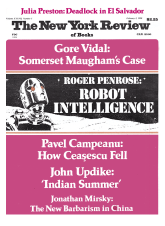The conduct of international affairs and the practices of the Mafia would often look remarkably alike if the Mafia code were less inhibited by chivalry when it comes to injuring women and children.
President George Bush’s posture toward General Manuel Antonio Noriega has long since passed far enough beyond the statesmanly to the personal to entitle us to infer the special venom that the managers of dubious enterprises feel for some agent or co-conspirator who had not met their definition of an honest man, which is that when you buy him, he stays bought.
Our CIA seems to have bought Noriega in the early 1970s when he was chief of Panamanian intelligence and got the first of its subsidies, which are said to have eventually crested at $150,000 a year. The Medellín drug cartel appears to have invested in Noriega shortly after the CIA did and, for a while, he was a jointly held stock.
There is no way to fix the precise date when Noriega may have recognized that Medellín was a patron equal in purse to and freer of hand than the Central Intelligence Agency. In any case, the United States was probably a minority stockholder early on.
Our own Drug Enforcement Administration identified Noriega to the CIA as a narcotics trafficker in 1976. Our presidents have a curious habit of never swearing to uphold our Constitution without in quick time casting off the injunction to treat every defendant as innocent until a trial has found him guilty. But in those days, CIA director George Bush was so much more scrupulous about such proprieties that he kept Noriega on the payroll.
By the 1980s, the investment had paid off with Noriega’s anointment as commander of Panama’s armed forces and his establishment as its head of state in fact. He was soon enlisted as shipping master for arms to the Nicaraguan contras and shield of the resistance to Marxism-Leninism in Central America.
He had become so essential that, in 1984, when he rigged a presidential election and the American ambassador recommended nonrecognition of the new administration, our government was so immune to these promptings of conscience that Secretary of State George Shultz flew down to be an honored and benign guest at the swearing-in of Noriega’s creatures.
But, by then, Noriega had risen above beguilement even by prostrations as abased as this one. He had found out that man can serve but one master and had opted for the more generous of his two. He was henceforth ineligible for serving the cause of freedom abroad while abusing it at home. Whether in partnership or spiritual communion with Medellín, he had arrived at its serene indifference to cold war quarrels, and ever since he has fraternized with Castro and ceased to trouble Daniel Ortega.
He had taken our money and he had skipped, and this was a crime against his purchasers far more heinous than any he had inflicted upon his citizens. As a result by 1987 the State Department’s human rights reports began to ring with arraignments of prior enormities of his that they had let pass with silence during the years when we had trusted him to have been paid for and thus permanently owned.
There is the story that, fifty years ago, a friend taxed President Franklin D. Roosevelt with his tolerance of Generalissimo Raphael Trujillo’s despotism and that Roosevelt replied that Trujillo was indeed an SOB, but that he was our SOB. To put the case in the terms of the old blues song, every SOB is yours, he’s mine, and he’s somebody else’s too. But George Bush was unconscious of that ancient wisdom, and his wrath has broken every bound of its normal containment, because it arises from the violated innocence of the party who misplaced his confidence in his partner in a guilty deed.
This Issue
February 1, 1990



